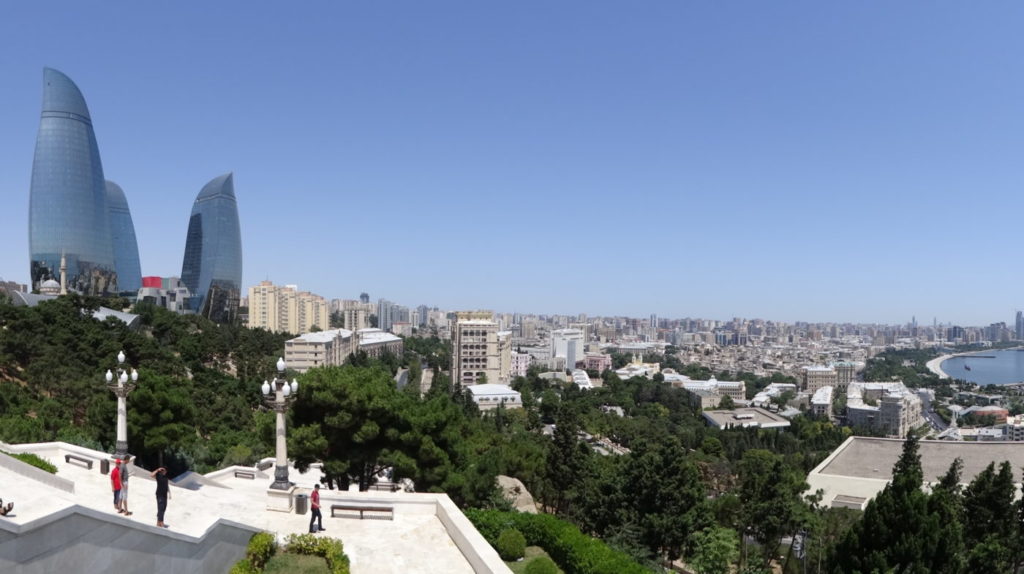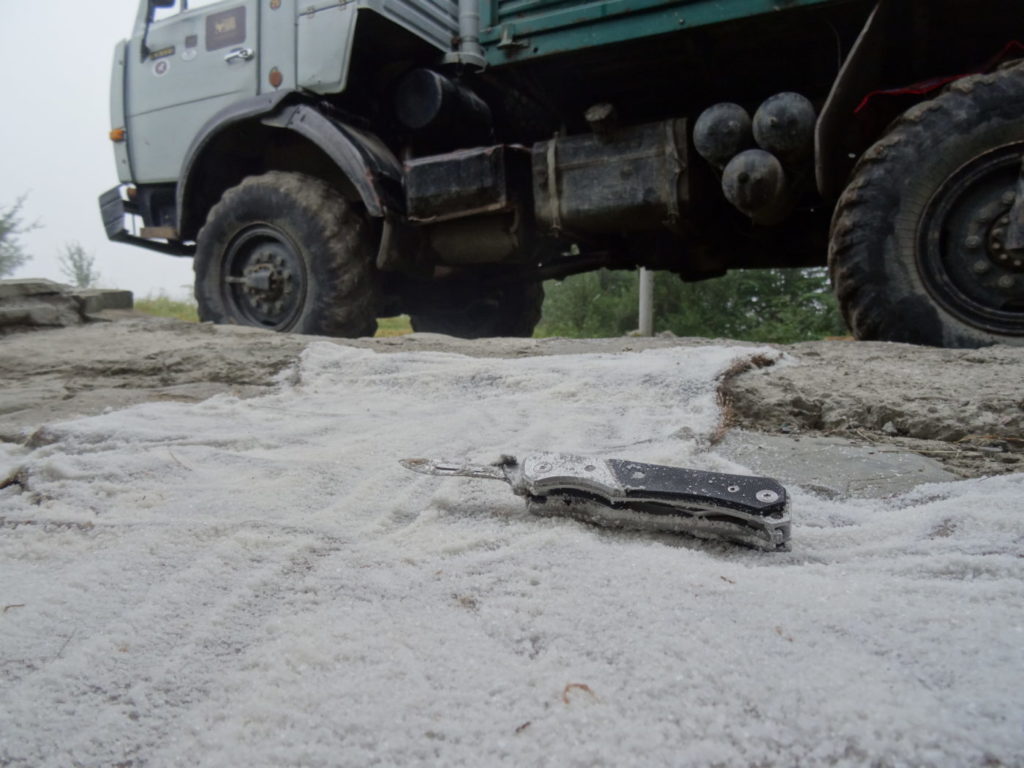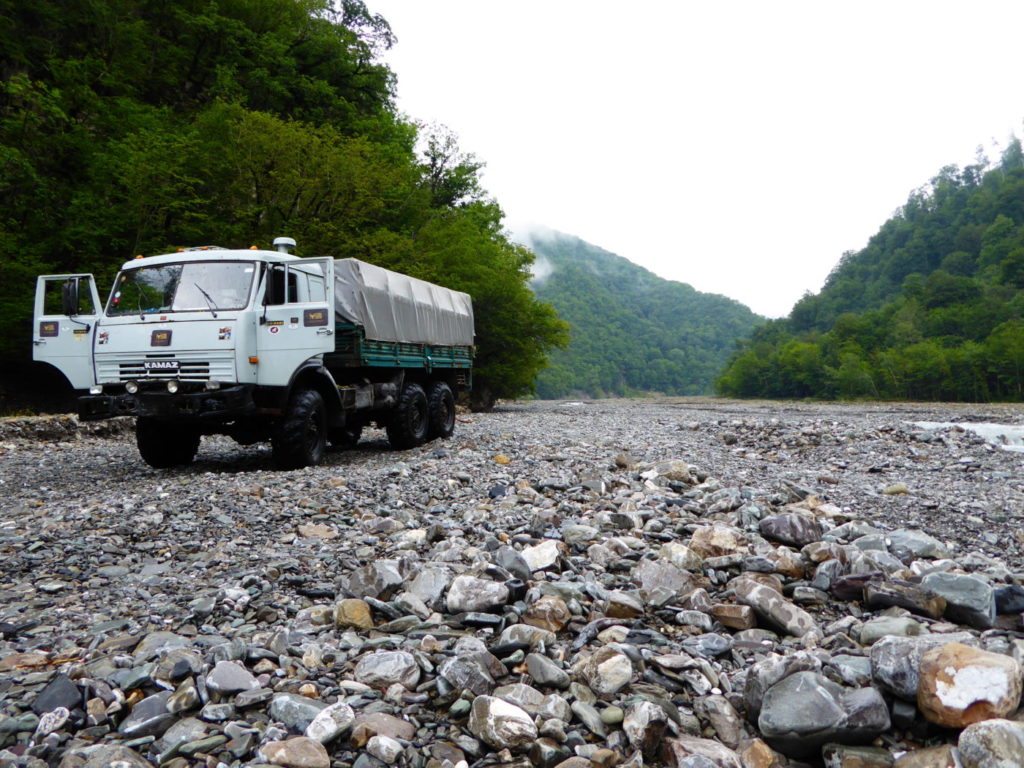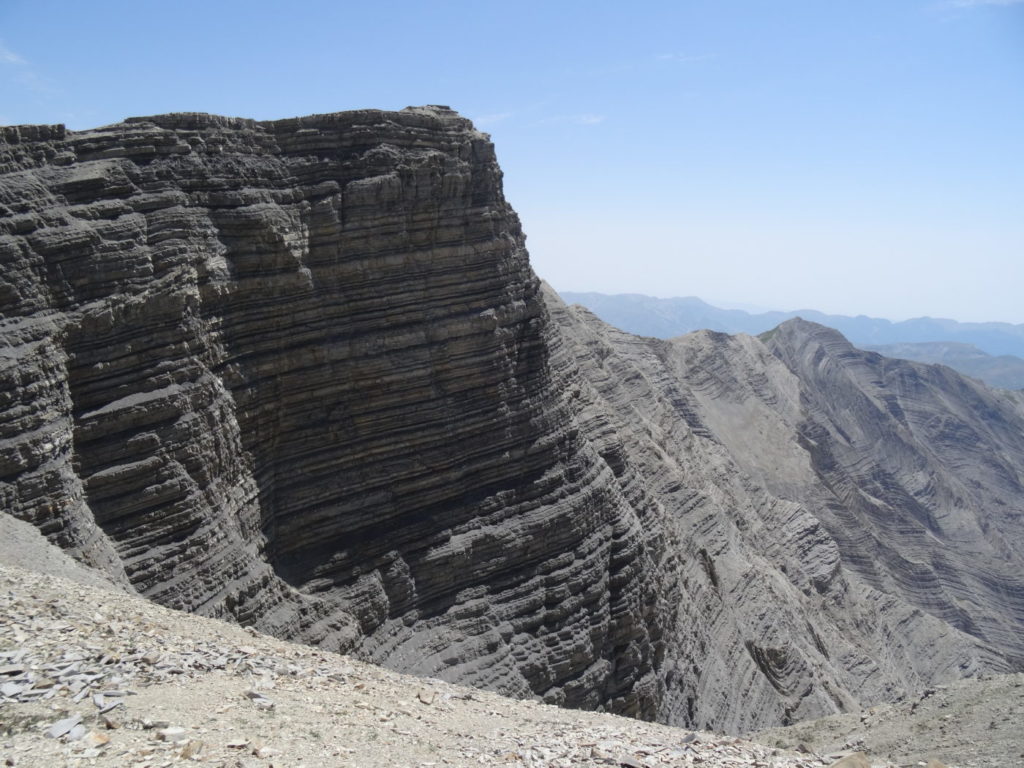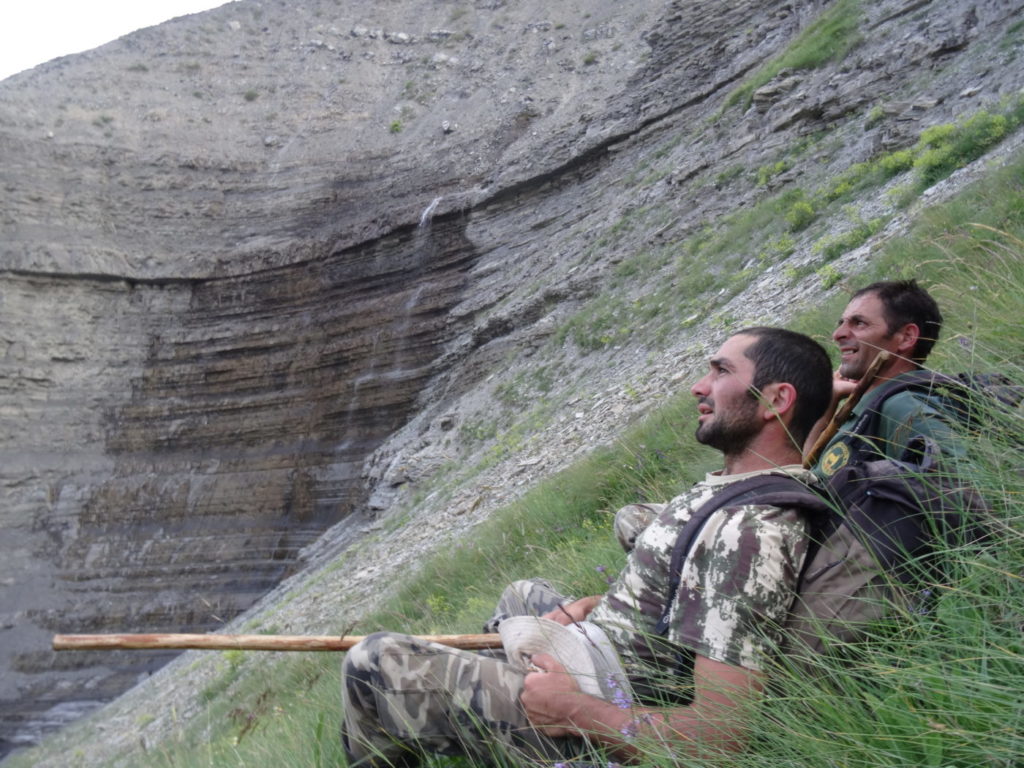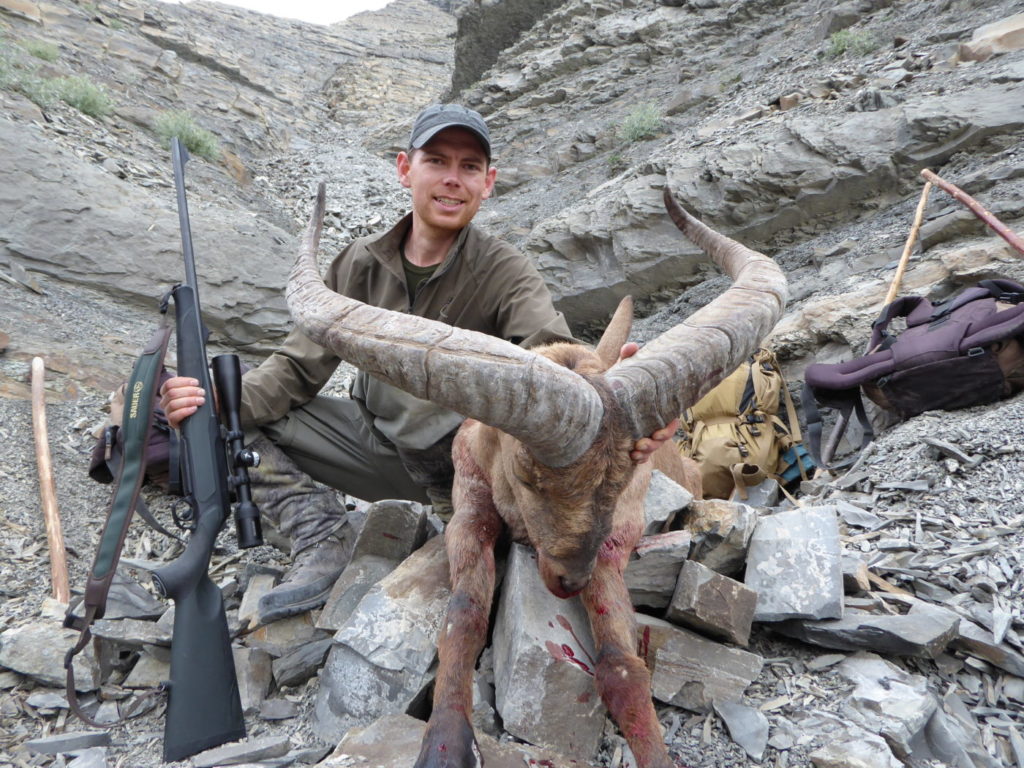Azerbaijan is a former Soviet country located on the border of Europe and Asia. Its northern regions are dominated by the mighty Caucasus Mountains, which extend into Russia and Georgia, while the capital of Baku is surrounded by an arid landscape reminiscent of the Middle East.
Baku is a combination of modern opulence and historical treasures. It has areas with marble-lined footpaths and incredible modern architecture surrounding the Old City which is ringed by a castle wall and holds some amazing ancient towers, traditional restaurants, and a maze of walkways amongst the old buildings.
The Greater Caucasus Mountain range has been formed largely by the collision of two tectonic plates uplifting what was a vast sedimentary basin. The fine layers of shale have been folded into dramatic formations that crumble underfoot, like walking on piles of broken china. Splashed amongst these jagged peaks are brush-strokes of land carpeted in lush green grass and a tapestry of wildflowers. These mountains are home to a variety of wildlife including European Brown Bears, Roe Deer, Wild Boar, Chamois, and Dagestan or Eastern Tur (Capra cylindricornis).
Tur are a unique species of goat that are commonly split into 3 subspecies. Occupying the southeastern part of the Caucasus is the Dagestan or Eastern Tur that is most commonly hunted in Azerbaijan. The northern part of the Caucasus is home to the Kuban or Western Tur which is typically hunted in Russia. Where these two subspecies mix exists the Middle or Mid Tur, whose status as a subspecies is subject to some debate.
Tur hunting is often considered one of the toughest mountain hunts available, characterised by brutal terrain, high altitude, tough animals, extreme climatic conditions, and logistical challenges.
Planning, Travel and Logistics
An outfitter is required to hunt in Azerbaijan. Thorough research and reference checks should be conducted to ensure you will receive the experience you are expecting. Expectations should be kept realistic and it is important to maintain an open mind – this is not North America and there are different standards. Some outfitters have very productive and high-quality areas, while others may have more marginal sites with lower success rates. The price of the hunt can be an indication of the quality of the area.
Flying to Azerbaijan is relatively simple; however, there are very few flights to Baku from the western world. You should aim to minimise the number of transfers on your journey to mitigate the risk of lost baggage and reduce potential complications that may arise when travelling with a weapon. Common transit countries include Turkey, Germany or the UAE. Be sure to monitor the stability of the regions through which you are transiting and ensure you have all appropriate permits to transfer through the airports of those regions. It is useful to arrive a day or two before the hunt to allow for lost baggage to arrive, collect any necessary supplies, explore Baku, and adjust to the time zone.
Ensure that your outfitter has someone available to meet you at the airport to assist with clearing customs and managing the import of your weapon. Azerbaijan customs are very thorough, and it is important to ensure that the details of your firearm (serial number, calibre, number of rounds of ammunition, etc.) are correct on your Azerbaijan Firearm Permit. A pre-arranged visa is required for travel from most western countries, and your outfitter should be able to assist with this.
Your airline will likely have specific rules regarding the carriage of weapons and also for handling the horns, hides, and skulls (‘hunting trophies’ as they are referred to by airlines). Ensure you clarify this in writing with the airline prior to booking flights. Many airlines will not transport ‘hunting trophies’ and of those who will, some will not transport CITES (Convention on International Trade in Endangered Species)-listed species. Dagestan Tur are currently not CITES-listed but monitor this for change. The CITES is currently considering a proposal to list Kuban or Western Tur (Capra caucasica) in Appendix II (near-threatened with controlled trade) which may limit or prohibit hunting and transport of this species.
You may be required to purchase excess baggage for your weapon or to transport your horns, hides, and skulls home if you exceed your allowable weights. This can be very expensive with some airlines (around US $50/kg), so baggage weights should be carefully managed.
Security in Azerbaijan is taken very seriously, and you should be aware of local protocols. Very few local people own firearms or binoculars, and carriage of them will attract attention. Check to make sure hotels will permit your stay with firearms. Your outfitter may be able to assist with hotel bookings. Be as discreet as possible when transporting your hunting equipment.
If you intend to sight-see in Baku, be aware that photography of government buildings and officials is prohibited. Government buildings are not always immediately obvious. It would be unusual for a person to be carrying binoculars (even in a day pack) in Baku, and this may be treated with suspicion.
Communications are best conducted via mobile phone while in Azerbaijan. Satellite phones and other satellite communication devices are prohibited and may be seized at customs. Phone reception is good in and around Baku; however, this becomes patchy to non-existent in the mountains. Wi-fi is available at many hotels, restaurants, and at the Baku airport.
The people of Azerbaijan speak Azerbaijani or Azeri. This is a Turkic language with little similarity to English. In Baku some younger people speak broken English, and a few restaurants have English translations on their menus. Outside of Baku very few people speak English.
There are few online resources to learn basic Azeri, but it is worthwhile preparing a one page translation table of common terms that you may wish to communicate. Include translations of any particular matters that are important to you such as injuries, illnesses, dietary requirements, comfortable shooting distances etc. As a side note, it is remarkably difficult to communicate the concept of ‘tomorrow’ or ‘yesterday’ via sign language. Some outfitters will have an interpreter which is a valuable resource.
The currency of Azerbaijan is the Manat. The Manat is volatile as it is closely linked to the oil price. Recently it has been devalued and future devaluations are likely, which will again weaken the Manat. Be aware of the conversion rate and value of goods, particularly in tourist areas and at hotels. Most restaurants and hotels will also accept USDs at an exchange rate of 1 USD to 1.4 Manat (at present).
Taxi cabs are the best way to travel. Traffic is chaotic and compliance with road rules appears to be optional. A taxi cab around the city in Baku should cost between 5-10 Manat.
Unfortunately, there is an element of bribery and corruption in Azerbaijan. Your outfitter should handle any necessary dealings with officials when entering and exiting the country. Be careful in the city as tourists may be targeted by officials for trivial offences.
There are a number of cultural and local matters that should also be kept in mind. Azerbaijan is involved in an ongoing territorial dispute with Armenia over an area called Nagorno-Karabakh. You may be refused entry into Azerbaijan if you have visited either Armenia or Nagorno-Karabakh. You should not discuss this dispute or Armenia.
Being a largely Muslim country, Ramadan is observed by many residents. During Ramadan many government and business services are closed or operate sporadically, which may interrupt your plans. If possible avoid travelling during these times.
Alcohol is commonly consumed and can be easily purchased. Owing to its Soviet heritage, vodka is particularly popular, and many cafés and restaurants will serve alcoholic beverages.
Prior to travelling see your doctor about appropriate vaccinations and medications. Be self-reliant as there will not be comprehensive medical supplies available in the mountains. In particular ask your doctor about taking Dukoral – a cholera vaccination which is known to reduce the risk of travellers’ diarrhoea. In Baku medical supplies can be sourced from one of the many ’Aptek’ outlets. Altitude sickness is a serious condition that should also be discussed with your doctor.
The Hunt
Most hunts start at a base camp with permanent or semi-permanent facilities. Here it is wise to eat and sleep well before heading into the mountains. These two things will deteriorate rapidly upon entering the mountains.
You will likely ride horses from a base camp into the mountains. Horses are the only mode of transport that can access this terrain. Ensure your riding abilities are adequate and you can ride at least to a canter — your skills will not be assessed before departing. Be sure to adjust your stirrups to the correct length if you have them. Stirrups should not be used in rough parts of the mountains, to prevent you being dragged down a mountain with a falling horse. If you are carrying your backpack while riding, cinch it down tight and do not wear your binoculars on your chest harness.
During your hunt, usually at lower elevations while travelling into the mountains, you may encounter shepherds and their livestock. These shepherds are very poor but generous people and often invite you in for tea. It is nice to have a small gift for them like a few USDs or a pack of cigarettes.
Hunts in this region often take place at elevations exceeding 3,000m (~10,000ft). While this may not seem significant to some, it can take its toll if you are not acclimatised. At this elevation available oxygen is nearly 30% lower than at sea level. With this in mind, it is important to have a good level of physical fitness and mountain experience. The terrain is extreme and the guides will not hesitate to pursue animals in locations that would normally be considered inaccessible. Stalks often involve traversing sheer faces where a fall would mean significant injury or death. Be sure of your abilities and advise your guides if you are not comfortable. Despite your guides penchant for rubber boots, a quality mountaineering or hunting boot is highly recommended.
Your guides will have varying levels of equipment. In many cases they will not have optics. The guides typically have excellent game spotting abilities but they will often acquire your optics to find animals. If they haven’t got your binoculars they will have your rifle and/or spotting scope searching for animals. It is advisable to take a second pair of binoculars for your guides if you wish to glass using your binoculars.
You will be given the opportunity to sight your rifle in when you arrive. Sighting in may be conducted in less than ideal conditions (e.g. raining, rocky riverbed, unusual positions, etc.), so be comfortable shooting in a variety of positions and be confident in your equipment.
Tur are tough animals, weighing around 90-140kg, and live in extreme terrain, so consideration should be given to an appropriately hard-hitting calibre/poundage and solidly built projectile/broadhead. Ideally you want to anchor them quickly, as they can disappear down sheer faces, and it is unlikely that you will get a follow-up shot. Shot angles may not be ideal, so choose a projectile/broadhead that can penetrate appropriately.
Owing to the terrain, you may have to make a long shot at an extreme angle. A rangefinder, ideally with angle compensation, is essential. Be honest with your guides about your shooting abilities. Be confident shooting to at least 300-400m, and always check a guide’s estimate of distance with your range finder. Archery hunting of Tur is extremely challenging, and again, long shots should be expected. Recovery from deep ravines may not be possible so check this before taking an animal.
Your equipment should be familiar and reliable. As with any mountain hunt it is critical to have good quality rain gear, well-worn sturdy boots, a warm sleeping bag, and a quality backpack. Tents may be provided by the outfitter; however, a quality 4-season tent is required. While travelling to the base camp it is a good idea to pack all of your equipment into a large waterproof duffel bag, as it may become wet.
Most outfitters will provide you with a timber trekking pole. These sturdy poles are life-savers in the mountains, and your guides will show you how to use them. You will need to carry this pole at all times, including when riding.
The diet of the guides consists largely of bread and cigarettes supplemented with salami, cheese, 2-minute noodles, canned fish, and some meat. Food hygiene may not be adequate for your weak western stomach. On day four of no refrigeration when the guides joyfully advise they are cooking chicken, it is wise to borrow some hot water for a dehydrated meal. There are a number of supermarkets in Baku where you can collect some basic supplies such as tins of fish, lollies, nuts, etc.
Water management is important particularly during summer hunts, where you will experience high temperatures and physical exertion. Your guides will go all day on a litre of water in +30C summer heat. Water is available in some valley bottoms but cannot be relied upon. Carry the amount of water you require and the treatment system of your choice. Only consume bottled water when in Baku and the villages.
It is not uncommon to look over dozens of animals each day. Assessment of the maturity of an animal lies solely with you. Your guides will be able write their approximation of the size or age of an animal on a piece of slate but you must form your own opinion. Size assessment is typically conducted in metric units (centimetres). A quality mature Tur exceeds 80cm in length for each horn. Guides are likely to overestimate the size of any given animal by 5-10cm. Old, broomed billies may not meet this length but should be considered excellent quality animals. Guides may attempt to pressure you into taking an animal that is immature, but you must be firm and consider your own standards.
If you are lucky enough to take an animal you will then have the difficult task of field preparation, caping and carrying it back to camp. Bring a caping knife and know how to cape. Care of your hide, horns and skull may not meet your standards and it is often better to manage this yourself. Your guides should know the basics, but their methods and equipment may be neither adequate to preserve your cape for the journey home nor meet your country’s quarantine standards.
Post Hunt
Depending on the stringency of your customs and quarantine, you may need to pay particular attention to the preparation of your cape, skull, and horns. There are very limited options to deal with them in Azerbaijan. The best option is to treat them in camp and take them home with you. This will include boiling and cleaning the skull, cleaning the horns, and salting the cape.
Ensure you remove all meat from the cape and skull. The skull needs to be chiselled out to ensure any little pockets of meat are removed. An overnight soak in diluted bleach can assist in removing any odour and sanitising the skull. Take a bottle brush and detergent to clean the inside of the horns and an extra few kilograms of salt for treatment of the cape. The salt in camp may not always be suitable (wet, coarse, used, etc.). You can pick up these supplies in most supermarkets in Baku prior to your hunt.
It may also be useful to have an extra day in Baku prior to departing in the event that you take an animal on the final day of your hunt. This will allow you to sufficiently salt and dry your cape for the return journey. It will also allow you time to clean and dry your equipment.
For your return journey, package your cape securely such that any moisture or condensation that may seep out does not affect your other luggage or attract unnecessary attention from customs officers. Consider attaching a document to your capes/skull/horns advising what is contained in the package and that all appropriate permits are held. This may prevent overzealous airline or customs officers from seizing your hard-earned trophy.
Conclusion
Hunting in Azerbaijan is certainly one of the pinnacles of mountain hunting and offers the opportunity to experience a unique culture. It provides an extreme challenge and adventure for the serious hunter. It will test your mental and physical resolve but also will provide an immensely rewarding experience for those who accept the challenge.


